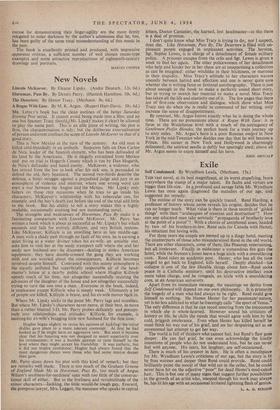Exile
Self Condemned. By Wyndham Lewis. (Methuen. 15s.) Tins vast novel, at its best magnificent, at its worst stupefying, bears everywhere the stamp of a major talent. Its faults and virtues are bigger than life-size. In a profound and savage fable Mr. Wyndham Lewis has once again diagnosed the maladies of our age, and suggested no remedy.
The outline of the story can be quickly traced. Rene Harding, a professor of history whose name reveals his origins, decides that he can no longer teach. What value is there in these records of 'gilded things' with their "arabesques of creation and destruction"? How can any educated man take seriously "propaganda of brotherly lovo at the point of a pistol"? With a chorus of antiphonal asses, headed by two of his brothers-in-law, Rene sails for Canada with Hester, his reluctant but loving wife.
For three years the couple are mewed up in a dingy hotel, meeting the counterparts of those who misunderstood Rene in the old world.
There are other characters, some of them, like Peasoup, entertaining, but all irrelevant. Finally in midwinter a tremendous fire guts the hotel, while the firemen's hoses leave a huge icicle with a smouldering core. Rene takes an academic post. Hester, who has all the time longed to get back to England; kills herself. Deeply shocked—his collapse is one of the few likeable things about him—Rene seeks peace in a Catholic seminary, until his destructive intellect once more takes charge, and he congeals, an icicle with a smouldering core, at an American university.
Apart from its immediate message, the meanings we derive from Self Condemned will depend on our own philosophy. It is primarily the tragedy of a man who had always to be right. Rene could give himself to nothing. He blames Hester for her passionatel nature, yet is no less addicted to what he freezingly calls "the sport of Venus." The only difference is that he can recoil sneering from the encounters in which she is whole-hearted. However sound his criticism of history or life, he chills the minds that would agree with him by his cold, priggish intolerance. Even when Hester has killed herself he must think his way out of his grief, and see her despairing act as an envenomed last attempt to get her way.
The world is full of thinkers who cannot feel, but Rene's flaw goes deeper. He can feel grief, he can even acknowledge the kindly intentions of people who do not understand him, but he can never feel with anyone. His tears, his laughter, are self-occasioned.
There is much of his creator in him. He is often a mouthpiece for Mr. Wyndham Lewis's criticisms of our age, but the story is lit by fires warmer and deeper than Rene could provide. Rene could brilliantly point the moral of that wild cat in the cellar, but he could never have hit on the adjective "poor" for dead Hester's mud-caked hair. This is but one of many signs that suggest further possibilities in the growth of an artist who, unequal though his work may always be, has lit his ago with an occasional irritated lightning flash of genius.
L. A. 0. STRONG


































 Previous page
Previous page